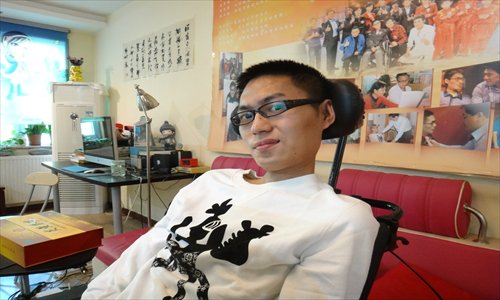Final testament to hope & courage


For most people tomorrow is a just a new day. But some fall asleep knowing they might not see the next dawn.
Wang Jia, a 28-year-old Chinese man, is in the late stages of Amyotrophic Lateral Sclerosis (ALS), the same disease afflicting Stephen Hawking, the great British theoretical physicist. In Wang's Sina blog, he posted, "I know I have a few months left. But I will not give up and will continue fighting for living with dignity. I will use my courage to build a city of hope, leading others out of desperation."
Hawking wrote a letter of encouragement letter to Wang in 2010, saying, "However bad life may seem, there is always something you can do, and succeed at. While there's life, there is hope."
Wang lives up to these words. As his control of his body gradually fails, he sticks to his work as a designer. He has donated more than 100,000 yuan ($15,900) from his income to earthquake-stricken areas. He managed to finish and publish in July his 200,000- word book There is No If in Life, even though at the time he could only use one finger.
Tears of exhaustion
When Metro Beijing reporter entered into Wang's home, a two-bedroom apartment in Haidian district provided by a kind man to use for three years free of charge, Wang was sitting in a chair. He is quite skinny and his cheeks have caved in, making his eyes appear large and hollow.
Wang's mother said that he can no longer eat and is fed through a tube into his stomach.
Just a few months ago, Wang could still move a finger, but now the only part of his body that he can still control is his eyes. Wang moves his eyeballs to manipulate a machine that is linked to his chair to type the words he wants to say. Then a machine reads it.
Wang's eyes often feel exhausted and fill with tears after staring at the screen for too long. Before Wang was diagnosed with ALS four years ago, he was a handsome young man pursuing his dream to be a designer in Beijing.
Born in a normal working class family in Baicheng, Jilin Province, Wang said his parents named him Jia (which in Chinese means first place) in the hope that he would do everything to the best of his ability.
He lived up to his name. In 2006, Wang snagged a job at the China Printing (Group) Corporation while he was an intern. He was one of three from 1,000 candidates to get the job. A year later, he was promoted to the leader of the design department.
Wang did not know a ruthless battle was waiting for him.
"In September 2007, I found it was hard to pronounce words clearly. And my reaction to things became slower," Wang wrote in his book.
Several months later, Wang was diagnosed with ALS, a rare motor neuron disease that occurs in four out of 10,000 people. The disease will gradually freeze patients' bodies to paralysis, while their senses and intelligence remain intact.
Fighting as a soldier
Wang told Metro Beijing that before he was ill he, like others born in the 1980s, was confused about how to live life. "I felt a kind of loss, like Wang Feng sang in the song 'Existence.' But when I was diagnosed with the disease, I began to understand how I should live."
Wang said everyone arrives at the same end in life's journey. So instead of complaining that life is unfair, he decided to live in the present and fight as a soldier.
"I did not have a special plan for life's journey. But I work step by step toward my life goal. I don't waste time and never live life aimlessly," he said.
With the goal of being a good designer, Wang continued his work.
"I very much appreciated that period of time when I could still work as a normal person," said Wang.
However, after only 4 months, his company decided to terminate his contract, which brought him 30,000 yuan compensation. He used the money to buy a respirator, the most important equipment for an ALS patient.
Helping others
After departing from the company, Wang became a freelance designer. During those four years, he designed more than 100 works and gave away the proceeds.
"I know I am poor and suffering from illness," he said. "I want to be a spiritual millionaire."
In Wang's book, he recounts that when the Wenchuan earthquake happened in Sichuan Province in 2008, he designed two works to express his emotion about the earthquake, which later brought him 3,000 yuan. Wang immediately asked his mother to donate it.
At that time, Wang and his parents only lived on his mother's retirement pension, just above 1,000 yuan a month, and Wang's 600 yuan subsidy for people with disabilities. "My family only spent 10 yuan everyday, but when I told my parents about the decision, they supported me with no complaints."
Wang decided ALS patients belong to a neglected group, and he should make efforts to draw more attention to them.
"Compared with other patients, I am lucky for the attention given to me by the public," said Wang.
"We are a voiceless group and can not fight for our rights. So I hope that through talking to people who have voices, more care and support can be given to us," Wang told Metro Beijing.
ALS is considered an incurable disease. Currently, there are around 200,000 ALS patients in China, unable to receive medical assistance from the government.
Xu Hong, whom Wang Jia referred as his second mother and on behalf of him, said that Wang Jia Foundation will be established on October 30, and will focus on helping ALS patients in China.